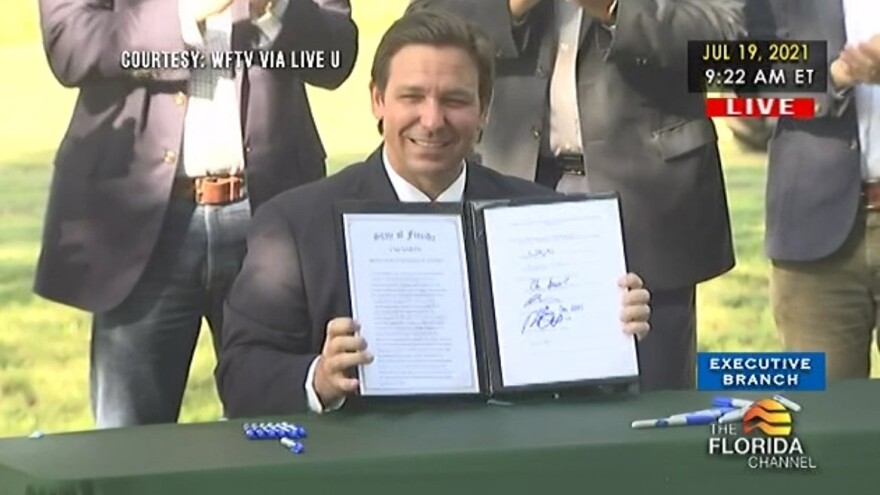Earlier this year, state lawmakers doubled funding for the Florida Forever land conservation program to $100 million. They also agreed to put $300 million from federal stimulus funding toward land conservation. This bill encourages much of the money to go to purchasing links in the wildlife corridor, providing a continuous path for animals to migrate.
During Monday's ceremonial bill signing, Gov. Ron DeSantis said during the last two years, the state has acquired nearly 70,000 acres through Florida Forever - more than the previous four years combined.

"The Florida Wildlife Corridor Act is the culmination of a decade of efforts by many of the people here today, highlighting the importance of connected wildlife habitats and land preservation," he said.
The money also ramps up efforts to preserve working ranch and farm lands in the corridor through conservation easements — paying landowners to not sell their land to developers.
Several speakers at the signing said Florida is an example of wildlife conservation for the rest of the country.
House Speaker Chris Sprowls of Palm Harbor said the bill unites all Floridians.
"It brings together our cattle ranchers, our wildlife conservation community, Republicans and Democrats, people who are worried about the future of Florida," he said, "and what Florida will look like for hundreds of years and what it will look like for our children and our grandchildren."
Tampa nature photographer Carlton Ward Jr. has been lobbying for the wildlife corridor since at least 2012, when he took the first of two 1,000-mile treks across Florida as part of the Florida Wildlife Corridor Expedition. The first passed through the location of the bill signing at Disney Wilderness Preserve in Osceola County.

Ward said the first 50 days of their first trek barely left the Everglades watershed. It began at the tip of Everglades National Park and continued through this area at the Disney Wilderness Preserve.
"Florida is leading the country through land conservation programs like Florida Forever and through this Florida Wildlife Corridor Act," he said. "Through this framework, we will be the national and global example of what's possible for nature and economies together."
"The Florida Wildlife Corridor Act is the culmination of decades of efforts focused on the importance of connected wildlife habitat and land preservation," Ward said. "The Florida Wildlife Corridor encompasses 18 million acres of land, and the Act encourages and promotes the protection of these lands to prevent damaging fragmentation of wildlife habitats, safeguard vital headwaters, support working cattle ranch and farmlands, and much more."
The bill passed by a rare 115-0 vote in the House and a 40-0 vote in the Senate — and they passed a budget that includes ways to pay for it.
The act was a last-minute amendment to an existing bill advocating protection of the Wekiva River watershed near Orlando inserted by Jason Brodeur, a Republican from Seminole County who chairs the Senate's Committee on Environment and Natural Resources.
"We've been working behind the scenes for years," said Mallory Lykes Dimmitt, who was with Ward and bear biologist Joe Guthrie on the Florida Wildlife Corridor Expedition.
It is the most significant spending on land conservation since voters overwhelmingly approved a state constitutional amendment in 2014 aimed at restoring funding to historic levels.
The Act includes numerous provisions:
- Securing access to habitats for wide-ranging wildlife, including the endangered Florida panther, and preventing fragmentation of critical lands
- Protecting the headwaters of major watersheds (including the Everglades and St. Johns)
- Helping to sustain working farms, lands and forests
- Preserving lands and waters to protect coastal estuaries





